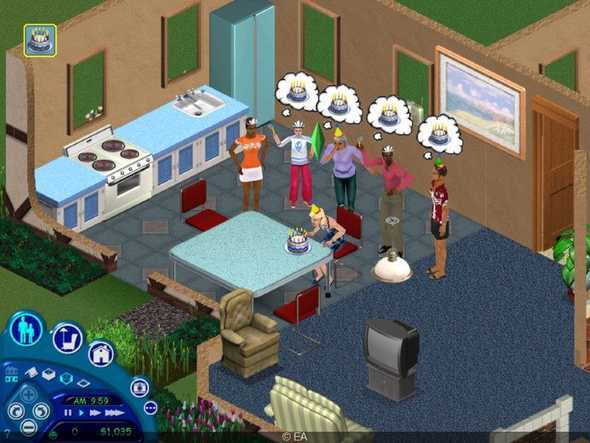Everyone knows, of course, that the best game in the world is The Sims. But only as an adult did I discover the pure gold that is the game’s subreddit. I’m not judging your guilty pleasure.
This week an old thread popped up where hundreds of players complained that if they increased the “free will” setting for their Sims (a configuration that reduces the amount of user control), the Sims would just hang out in front of the computer at every free moment and refuse to do other things.
So I wondered - how do the Sims actually choose when they act independently (when we don’t give them a task, or when they insist on doing what they want)?
Instead of programming endless rules - the developers built (in the 90s!) an AI mechanism called a needs-based scoring engine - every object in the room broadcasts its ability to satisfy the Sims’ needs (like hunger, fun, hygiene, etc.). For example, the sofa broadcasts “sit on me and I’ll give you 10 comfort points.”
Turns out the idea for this mechanism comes from ants! When an ant finds food, it starts returning to the nest, dropping a pheromone along the way that creates an invisible scent trail. Ants encounter it and head to the food source, and when they return to the nest they also secrete the pheromone, making the trail even stronger. New ants will be drawn to the highest concentration of the chemical, attracting the whole colony. When the food runs out, the ants stop secreting the chemical trail and the substance evaporates.
Will Wright, who designed the game, took this mechanism and used it - the pheromone is the digital weight given to objects, and the Sims are drawn to the object with the highest number. This explains why the Sims are glued to the computer - its score for “fun points” is terribly high, and it beats everything else!
And like any normal person, I remembered Spinoza’s stone analogy: a thrown stone continues moving even after leaving the hand. It’s not aware that it was thrown, and if it had consciousness it might say “I choose to fly!”, though of course it doesn’t truly have the freedom to choose. Spinoza says that humans are like the stone - believing we make choices through free will, but actually acting from impulses, emotions, fears, and habits we’re unaware of.
His solution: to become aware of these external and internal reasons that shape how we act in the world. To recognize the success ideals that guide us toward them, to wonder why certain things seem more worthwhile, to understand that the computer is just shouting “fun!” really loudly.
That’s it. Motherlode for everyone.

